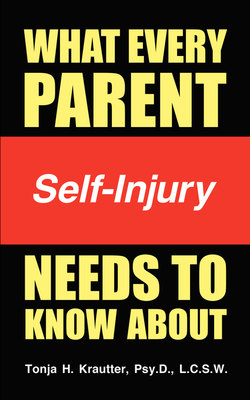Читать книгу What Every Parent Needs to Know About Self-Injury - Tonja Krautter - Страница 23
На сайте Литреса книга снята с продажи.
Acknowledging the Problem
ОглавлениеThe first step in treatment and recovery is acknowledging that there is a problem. This is not always easy to do. Your teen may experience great confusion, guilt, and shame for her actions. Admitting that there is a problem and seeking treatment demonstrates courage and great strength. The teen can be proud of herself for taking that first step in recovery. You, as parents, can be proud that you supported your teen in doing so.
Although self-injury is much better understood today than it was in the past, it is still accompanied by myths and stereotypes. Unfortunately, admitting to the problem means risking these misconceptions. For example, the fear of being labeled “suicidal” commonly prevents admission of the problem. As discussed, for the most part, individuals who self-harm do it to cope with distressing emotions, not with the intent to commit suicide.
In addition, the fear of being referred to as a “cutter,” which then follows with labels such as “psycho,” “borderline,” “Goth,” or “emo,” commonly inhibit identification of the problem. These labels often lead to disrespect and rejection from others. For example, Sarah is the senior class president at her local high school. She recently admitted self-injuring to some of her classmates. In turn, several of them questioned her leadership capability. Rhonda is the chief editor of her high school newspaper. Some of her classmates noticed the multiple scars on her forearm, and began treating her differently. One eventually asked her how many times she tried to kill herself and if she would ever hurt anyone else. When her teacher found out, he questioned her ability to perform her duties for the paper.
It is no wonder that many self-injurers hide this problem. For the same reasons, parents also often deny that a problem exists. Parents are understandably protective of their children. They certainly do not want their child to experience the pain and humiliation of a negative label as well as mistreatment from others. So they join with their child and avoid discussion of the problem.
Many parents will even go to great lengths to steer clear of topics they know are upsetting to their child, in an effort to minimize their child’s distress, and make them less likely to self-harm. In this example, parental intentions are good. However, the outcomes usually are not. Attempting to help your child feel better by helping them ignore or avoid their own distressing emotions often backfires. There is no lesson in it for them. Children need to learn how to manage their distress in healthy and functional ways. Otherwise, their distress may become too difficult to ignore and eventually lead them to negative coping methods (e.g., self-injurious behaviors, eating disorders, substance abuse, violence, etc.).
Another reason parents often deny there is a problem is because they see their children’s behavior as a reflection of their own parenting abilities. If you read this sentence and it stung a little, you are not alone. I know many parents who have struggled with acknowledging their child’s self-harm because they worry that it will somehow signify that they have failed as parents. The reality is that self-injury is a coping mechanism and a choice. Your child needs support, understanding, and guidance to help her get back on track and away from something that can be both psychologically and medically dangerous. Her problem is not about you. It is about her.
When a parent (even unknowingly or unintentionally) makes the problem about them, it sends a negative message to the child. How do you think the child feels if they know (and they always know!) that their parent is refusing to acknowledge their problem because of their own embarrassment and shame? The answer is that it makes the child feel awful. My question to parents is this: How is your child going to be able to admit the problem and get help when they know that their own parents, the people who are supposed to love them unconditionally, cannot handle acknowledging it? Children need motivation to get better. They need love, understanding, and support. Parents can help their child find the motivation necessary to change only when they can acknowledge that something needs changing.
